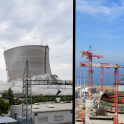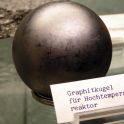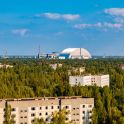News and press releases
GRS seeks to provide clear and careful communication. Our demands on the comprehensibility and quality of information are based on the Guidelines for good science PR.

Since the emergence of ChatGPT and similar technologies, artificial intelligence applications have become ubiquitous. There is now hardly any area of life or industry in which AI is not used, sometimes leading to far-reaching upheavals. In nuclear technology, too, AI is increasingly being used to support the development, operation and maintenance of nuclear installations as well as in the regulatory environment. The aim here is both to achieve efficiency gains and to enable the development of new technical approaches and methods. Since AI can intervene deeply in safety-relevant processes, issues of transparency, robustness – i.e. resistance to errors and unexpected situations – and regulatory compliance and integration are also of central importance.

Electricity, heat, hydrogen – and new safety issues: GRS experts involved in international project on the use of SMRs in hybrid energy networks

Be it software updates, cloud services or external analysis platforms - modern IT systems rely on a large number of digital service providers. What brings efficiency also harbours new risks: This is because attackers can penetrate deep into well-protected systems unnoticed via an inadequately protected supply chain - even in safety-critical areas such as nuclear engineering. A new GRS research project looks at how such attacks unfold, which systems are particularly at risk, and how operators can protect themselves better.

What happened last year in the field of nuclear energy? What developments can be observed internationally? The following overview shows the situation broken down by continent (Europe, America, Asia and Africa). Australia/Oceania is not included, as no nuclear power plants are operated there. After a brief summary, the countries that either operate reactors or are planning to start or are already building NPPs are presented for each continent.

The Chinese Shidaowan nuclear power plant recently made the headlines in Germany: According to a paper published in the scientific journal Joule, tests are said to have proven that a core meltdown accident in the world's first commercially operated pebble bed reactor has been ruled out and that it is therefore ‘inherently safe’. This article describes how this type of reactor works, what follows from the experiment, and what safety challenges may nevertheless arise.

With the shutdown of the last German nuclear power plants, the decommissioning of these installations is now at the centre of attention. However, the impending shortage of skilled labour poses major challenges for the industry. Experts from GRS are therefore working with their partners in a research project that has just been launched to train specialists more efficiently in the future and to promote young talent in a more targeted manner: A hybrid learning platform with VR and AR elements and an innovative AI application are intended to optimise dismantling processes and prepare the industry for the future. In addition, a digital platform is being developed to make licensing processes more transparent and efficient.
The Supervisory Board of Gesellschaft für Anlagen- und Reaktorsicherheit (GRS) gGmbH has appointed Dr Florence-Nathalie Sentuc as the new Technical and Scientific Director of GRS with effect from 15 August 2024. She succeeds Uwe Stoll, who held this position at GRS for the past eight years.

In connection with the current global warming, periods of heat and drought are also occurring more frequently in Europe, which has an impact, among other things, on water availability and temperature. This, in turn, also has an impact on the operation of nuclear power plants: Nuclear reactors in Belgium, France and Switzerland have already had to reduce their output in the last summers. In Germany, too, reactors have been running at reduced capacity due to heat in recent years. But why is that so? How do heat and drought affect operation? And are these effects relevant from a safety point of view?

On 26 April 1986, the most serious nuclear accident since the beginning of the use of nuclear energy occurred at the Chernobyl nuclear power plant in Ukraine. Due to a series of operating errors and the special features of the reactor type, the power output rose sharply (causing the coolant to suddenly vaporise), the reactor core was completely destroyed and the graphite it contained caught fire. Around eight tonnes of radioactive fuel were released into the environment. To this day, there is an exclusion zone within a radius of 30 kilometres. The following article explains what happened on site during last year and how GRS supported the work there.

Last week, the Élysée Palace confirmed that the French reprocessing plant at La Hague is to be expanded. Extensive investments are planned in this context. There have already been plans since 2020 to build another storage pool on the plant site. At La Hague, there is still radioactive waste from Germany, which may be returned this year.